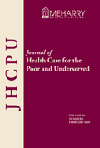UPDATE:
December 10, 2018 – The Association of Clinicians for the Underserved (ACU) has been very outspoken about the proposed “public charge” changes. ACU has also partnered with other organizations in hopes that a strong voice may convince leadership to understand the public health ramifications of the proposed changes. Here are multiple letters that ACU has signed opposing the public charge changes.
Partnership for Medicaid – Public Charge
Proposed Change is Unjust and Unhealthy
August 24, 2018 – The Association of Clinicians for the Underserved (ACU) finds that the Administration’s draft rule on “public charge” is both unjust and unhealthy. Many of our members care for low-income immigrant & refugee families, and we have already witnessed a fear on the part of many immigrant patients that accessing basic health care needs may jeopardize their ability to keep their families together. This proposed draft rule will create additional confusion, fear and poverty.
A recent New England Journal of Medicine article concludes that: “if this rule takes effect it will most likely harm the health of millions of people and undo decades of work by providers nationwide to increase access to medical care for immigrants and their families.” In addition, we agree that “poverty is a primary determinant of risk for illness and death. Numerous studies demonstrate that benefits such as EITC, WIC, and SNAP programs improve health throughout the life course and increase self-sufficiency in adulthood.” Families should not be forced to make a lose-lose choice with dire consequences for individual health, including the health of millions of U.S. born citizen children, and health care systems. Thus, we urge our government not to change the current and long-standing public charge rule.
Because the public charge rule is complex, we provide the following background and context:
What is a public charge? Under immigration law, the “public charge” test identifies individuals who may depend on government benefits as their main source of support. If a determination is made that someone is likely to become a “public charge,” he/she can be denied admission to the United States or refused an application for lawful permanent residency.
How is the public charge test applied today? The only benefits currently considered in a “public charge” determination are cash assistance (Supplemental Security Income or Temporary Assistance for Needy Families) or long-term institutional care at government expense.
What would the proposed “public charge” rule change? Proposed changes would allow the federal government to consider whether immigrants, or their family members including U.S. citizen children, have either applied for or received virtually any public benefit designed to help low-income individuals and families meet basic needs, including: Medicaid, CHIP, Affordable Care Act subsidies, earned income tax credits (EITC), food and nutritional assistance (SNAP, WIC) housing assistance and comparable state and local programs.
 Follow
Follow




Follow Us!